In one project, 210,600 lbs of plastic trays were recycled, with 30-40% of the recycled material being incorporated into feedstock for production, reducing CO2 emissions by 175 tons and saving over $400,000. Additionally, by reusing plastic pallets and lids, the OEM saved $80,000. In another project, Nefab facilitated the recovery of 2.1 million lbs of Polypropylene resin, which was reintegrated into the domestic feedstock pipeline, eliminating 123,000 transportation miles and significantly cutting CO2 emissions by 1,006 Tons. Both projects resulted in nearly 50% cost savings, showcasing the financial and environmental benefits of circular practices.
The context
Circularity: A Growing Trend in the Automotive Industry
As automotive production ramps up globally, circularity has become a key focus for OEMs, driven by rising demand and the environmental impact of increasing plastic production. The shift toward sustainability is no longer optional but an urgent need, as companies prioritize minimizing their environmental footprint and reducing waste. Circular practices, such as designing packaging for recyclability, are gaining momentum as OEMs seek to optimize packaging for reuse and recycling.

A Compounded Annual Growth Rate of 8.1% showcases the solid long term growth opportunities that exist within the plastics circularity ecosystem.
Legislative Pressures and the Role of Packaging Suppliers
Governments worldwide are accelerating policies aimed at reducing plastic waste and encouraging circular practices. The U.S. is catching up with global regulations by introducing infrastructure investments and grants to support recycling initiatives. Extended Producer Responsibility (EPR) policies are gaining traction, requiring manufacturers to ensure their products and packaging are recyclable at the end of their life. OEMs must align with these standards to avoid penalties and meet sustainability goals. Packaging suppliers are critical in supporting OEMs by offering circular solutions that not only provide recycled materials but also ensure packaging can be reused or recycled effectively.
Financial and Environmental Benefits of Circularity
Circularity initiatives offer clear financial benefits for automotive OEMs. By designing packaging solutions for reuse and recycling, OEMs can reduce reliance on virgin materials, leading to significant cost savings. Recycled materials in production not only reduce raw material costs but also help avoid disposal costs associated with packaging waste. Furthermore, recycling packaging back into the production feedstock pipeline significantly reduces CO2 emissions, contributing to global sustainability efforts and helping OEMs meet their net-zero targets.
By leveraging tools like Nefab’s life cycle analysis GreenCalc, suppliers can help automotive companies track CO2 savings and ensure their packaging solutions align with both environmental goals and regulatory requirements. This holistic approach enables OEMs to reduce costs, increase recycling rates, and maintain compliance with evolving legislation, driving both environmental and financial benefits.
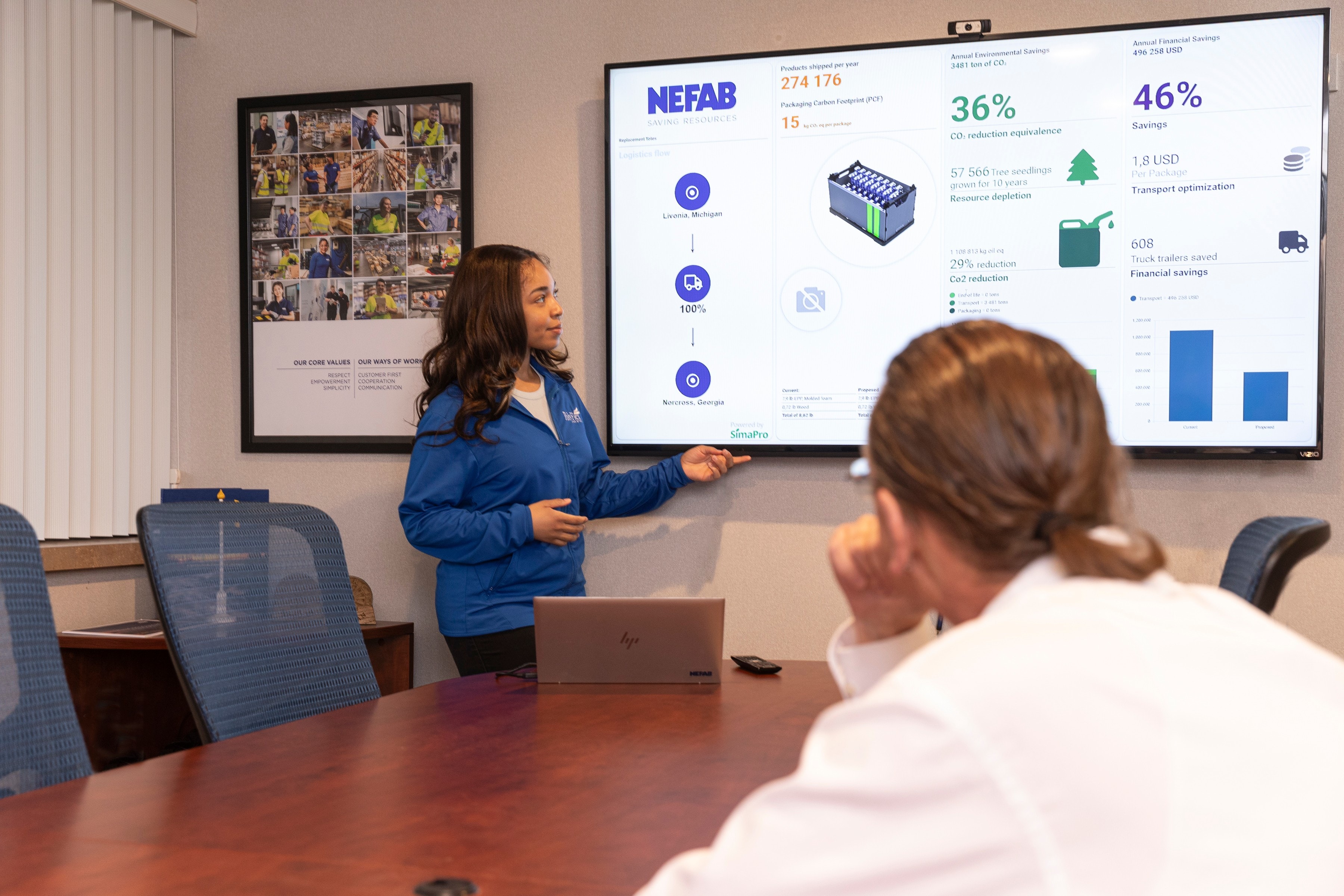
GreenCalc: Nefab’s Comprehensive Solution for Environmental Impact from Design to End-of-Life
The Situation
Sustainability in the Automotive Industry: A Holistic Approach
Automotive OEMs are increasingly aware of the need for a comprehensive sustainability strategy that spans the entire supply chain, with a strong emphasis on data collection. Companies are not only setting targets but are also focused on developing recovery plans for materials. The challenge lies in creating effective recovery systems rather than evaluating the inherent environmental impact of materials. As OEMs explore alternatives, the focus is shifting toward making informed decisions based on detailed carbon footprint analysis. This holistic approach enables companies to assess the full environmental impact of materials, from production to end-of-life solutions, ensuring they choose the most sustainable options.
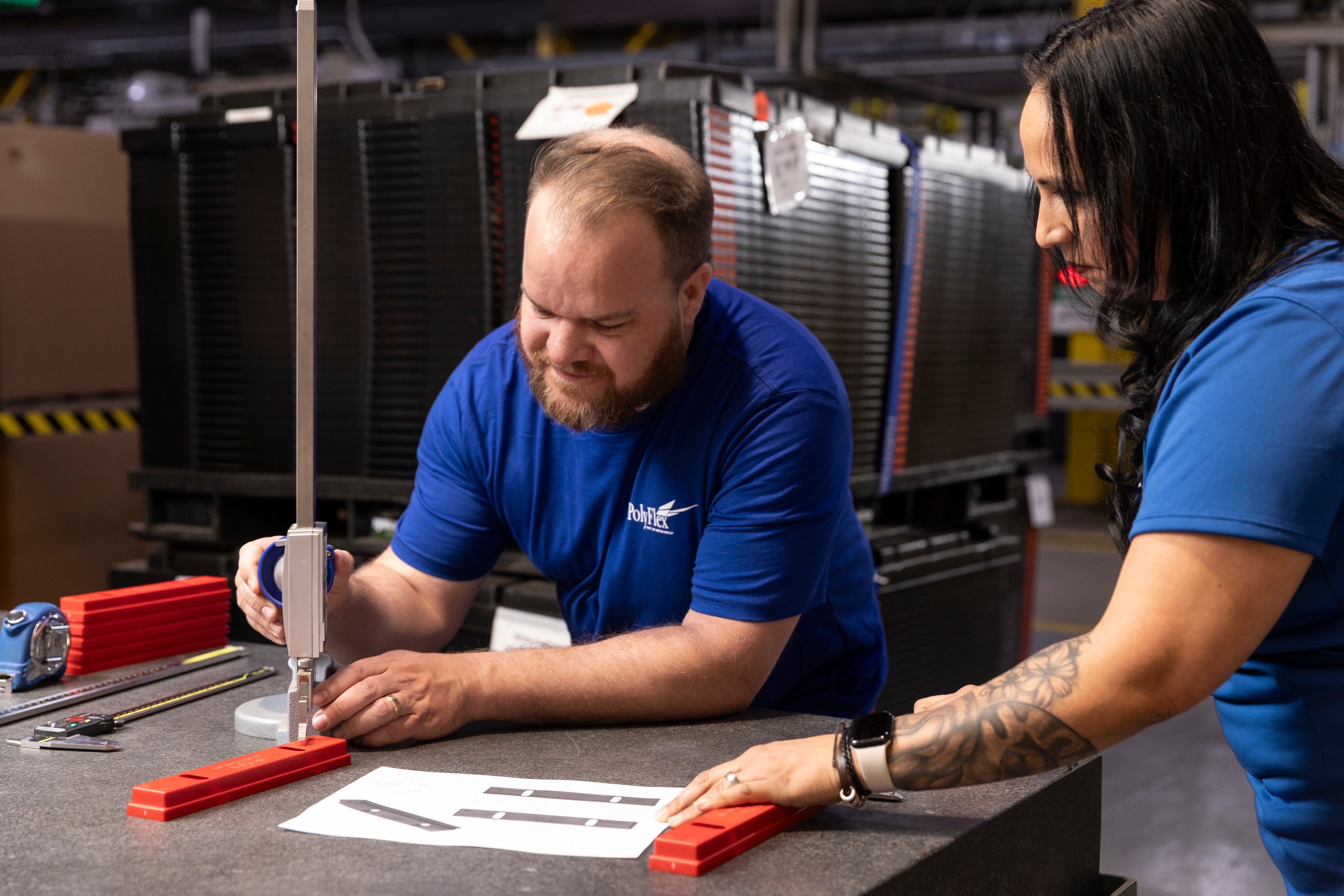
Quality checks are conducted regularly to ensure that structural and dimensional integrity are maintained when using recycled content.
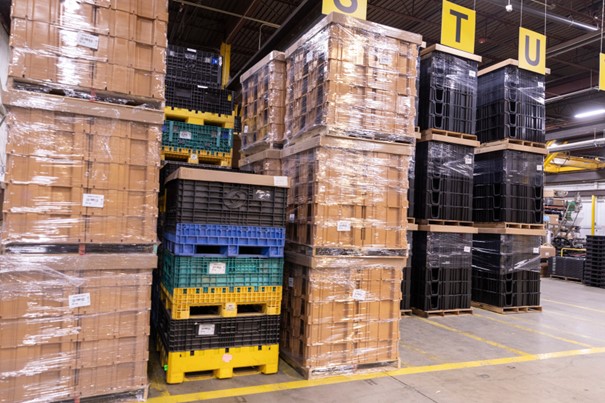
In supporting our customers' circularity efforts, we not only offer innovative design concepts but also assist with the handling of reusable packaging whenever possible.
The Goal
Nefab's Commitment to Sustainable Packaging Solutions
Nefab places a strong emphasis on developing innovative, sustainable packaging solutions that optimize supply chains. Over the years, the company has grown its global team of packaging engineers, not only in size but also in expertise. Through continuous advancements in technology and a collaborative approach with leading OEMs, Nefab strives to design products that save environmental and financial resources, while aligning with the evolving sustainability goals of the automotive industry.
Building Long-Term, Impactful Partnerships with Automotive OEMs
Nefab has been a trusted partner to leading automotive OEMs for decades, supporting them globally with end-to-end solutions that span supply chains, logistics, and recycling networks. Nefab grows alongside its partners, helping them navigate shifting standards and regulations while achieving financial and environmental targets. By offering consultancy and education, Nefab ensures that customers stay ahead of the curve in sustainability. The company emphasizes good stewardship, prioritizing environmental impact over short-term profits, and is committed to helping OEMs make informed decisions that benefit both their bottom line and the planet.
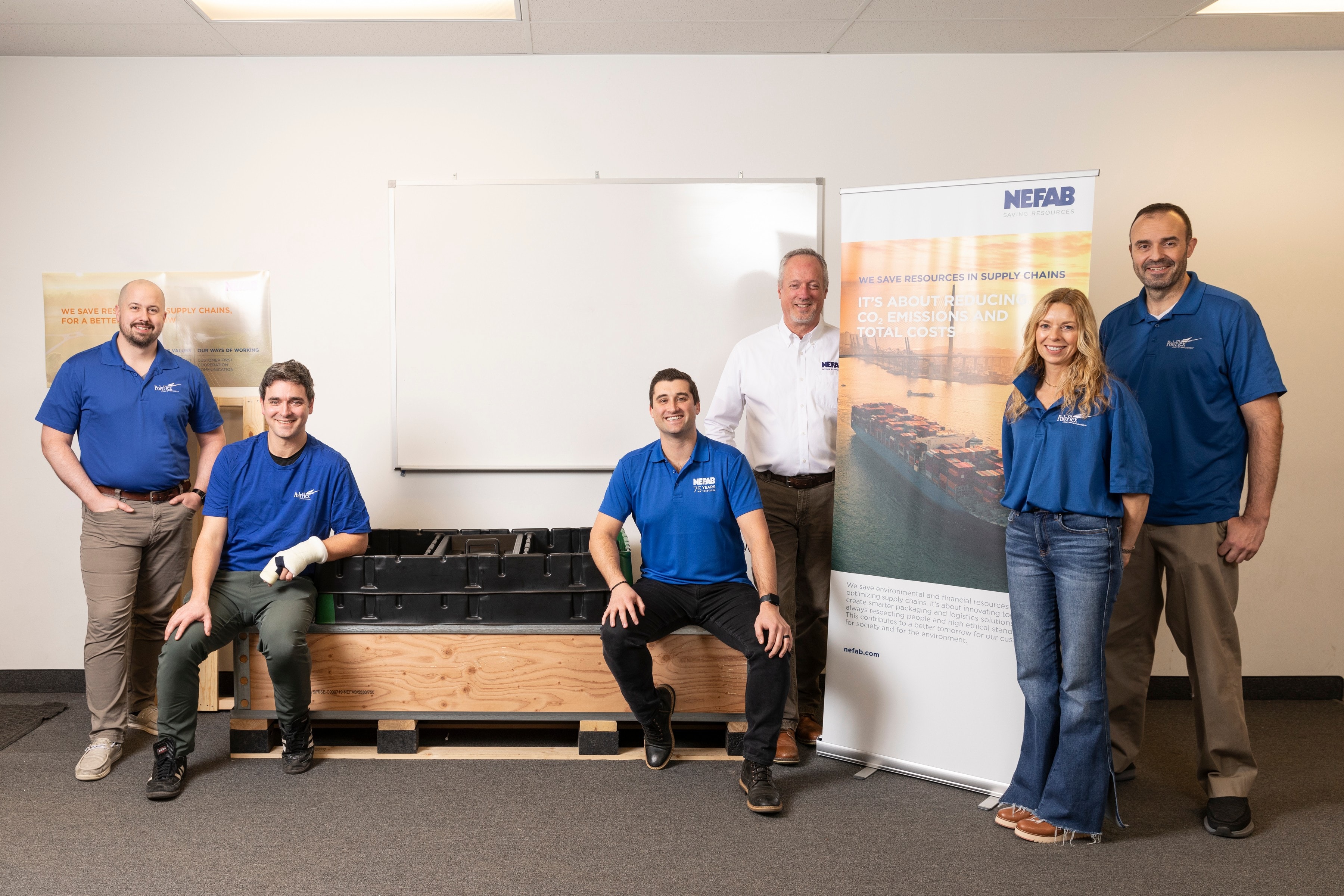
Empowered by decades of expertise and a circular mindset: Our Sales and Design teams leading the way in packaging innovation

The Solution
Project 1: Recycling and Redesigning Packaging for a Leading Automotive OEM
The customer faced an issue with their plastic trays used for transporting battery cells due to an engineering design change. The original trays became obsolete because they couldn't accommodate the new battery cell shape.
A redesign of the packaging was implemented, where the original trays were replaced with a new solution. The key innovation was the plastic pallet base and lid, designed with a standard footprint for long-term reusability across different applications. These reusable components were reused in future fleets and repurposed for other uses.
The trays, once deemed obsolete, were ground by a recycler and the material was reincorporated into future products. This approach minimized waste and supported sustainability goals.
The customer covered freight delivery costs. Through this process, over 210,600 lbs of plastic material was recycled, resulting in significant CO2 reductions and savings.
The project successfully reduced greenhouse gas emissions by 175 tons, saved 6,883 barrels of petroleum, and diverted 3,029 cubic yards of waste from landfills. The cost savings from using recycled materials amounted to over $320,000.
The standard base size of the pallets and lids ensured their reuse across multiple fleets, saving over $80,000 by repurposing the packaging components instead of purchasing new ones. This reinforced the value of "Designing for Recyclability" and the importance of circular practices in the automotive industry.
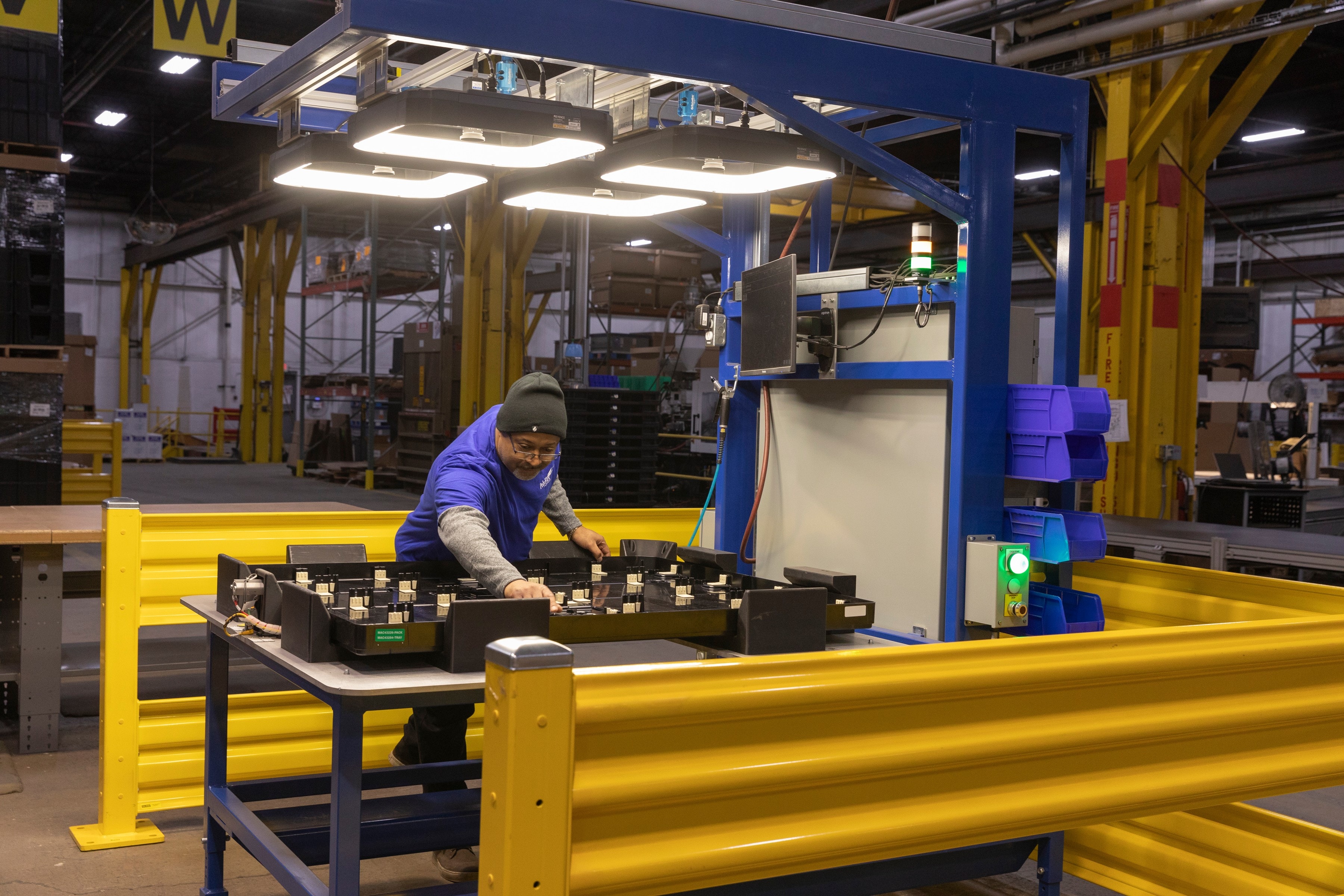
Leveraging vision system technology to guarantee exceptional quality and consistency, no matter the design complexity
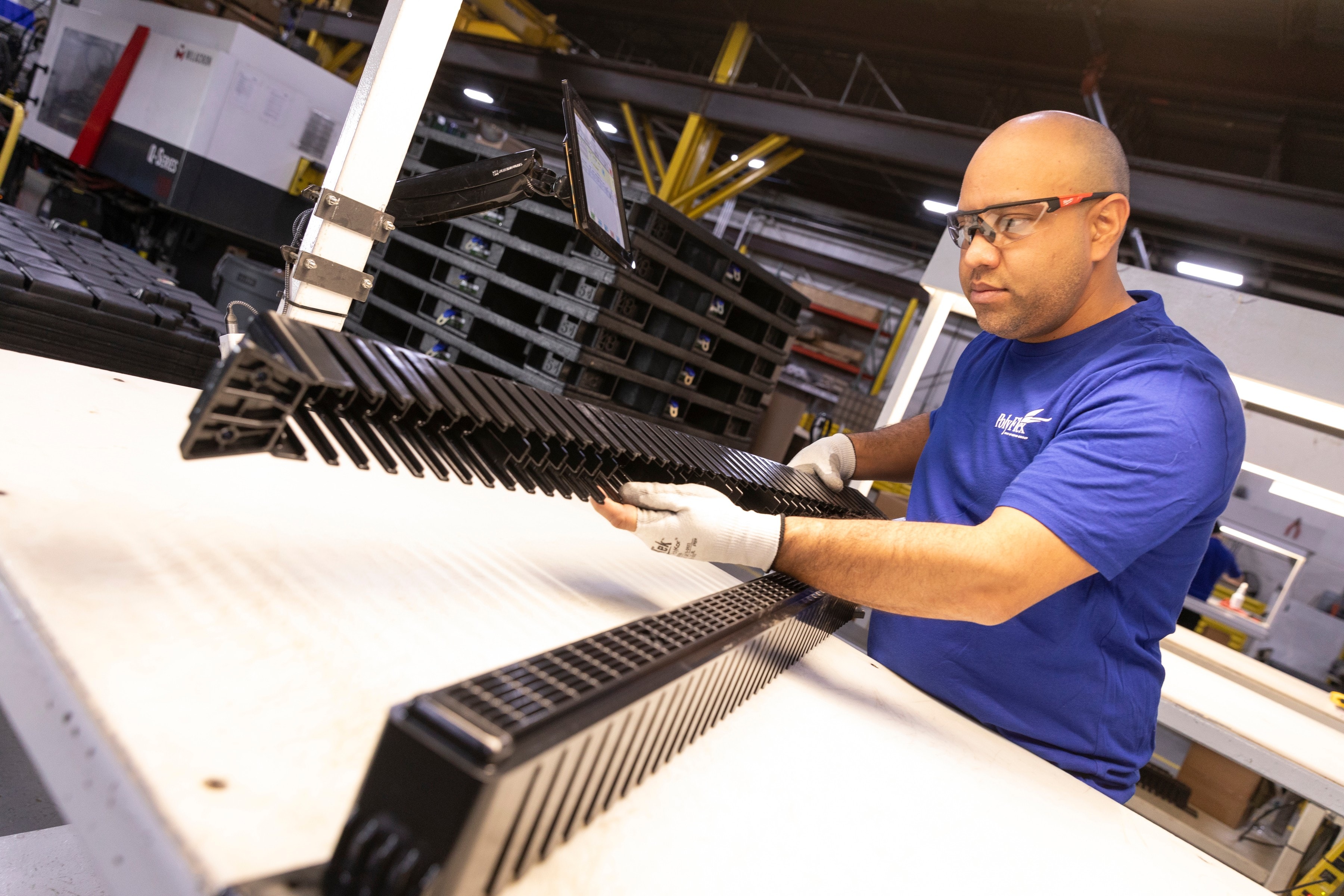
The true strength of circularity and mechanically recycled plastics is their capacity to be remolded into new products, repeatedly, with endless potential.
Project 2: Transition From Incineration to Recycling for a Leading Automotive OEM
The customer had been using expendable packaging that was incinerated after use, a practice that raised environmental concerns. The packaging, primarily made from polypropylene (PP) and corrugated material, came from Asia and had no viable recycling solution, so it was sent to incineration for energy recovery.
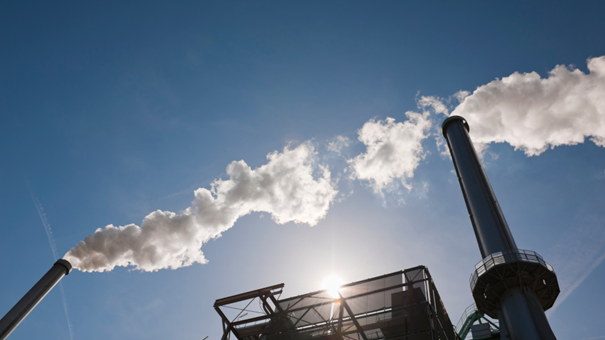
Waste-to-energy incineration is not only costly but should be considered a last resort, only after all other viable options for true recycling have been explored.
A new recycling strategy was implemented by identifying a local recycler, significantly reducing transportation distances and associated costs. This change provided a clear path for mechanical recycling, replacing incineration with a more sustainable solution.
By choosing a recycler located just three hours away, the customer saved 123,000 transportation miles, leading to a large reduction in CO2 emissions. Freight costs were reduced from $1,250 to $500 per truck load, and the environmental impact fee for waste-to-energy was eliminated.
Over 42,000 lbs of polypropylene were recovered each week, reintegrated into the domestic feedstock pipeline. This not only met recycling goals but also created a post-consumer material supply for other manufacturers.
The switch from waste-to-energy to full recycling transformed the environmental impact from one of the worst outcomes (incineration) to one of the best (recycling), marking a key achievement for the customer.
The packaging redesign also moved toward a mono-material, fully recyclable solution using rigid plastic, further reducing the environmental footprint. This new concept eliminates the need for a repacking process, cutting labor and warehouse costs. The shift to mechanical recycling represents a win for both sustainability and cost efficiency, ensuring the packaging components are fully recovered and recycled.
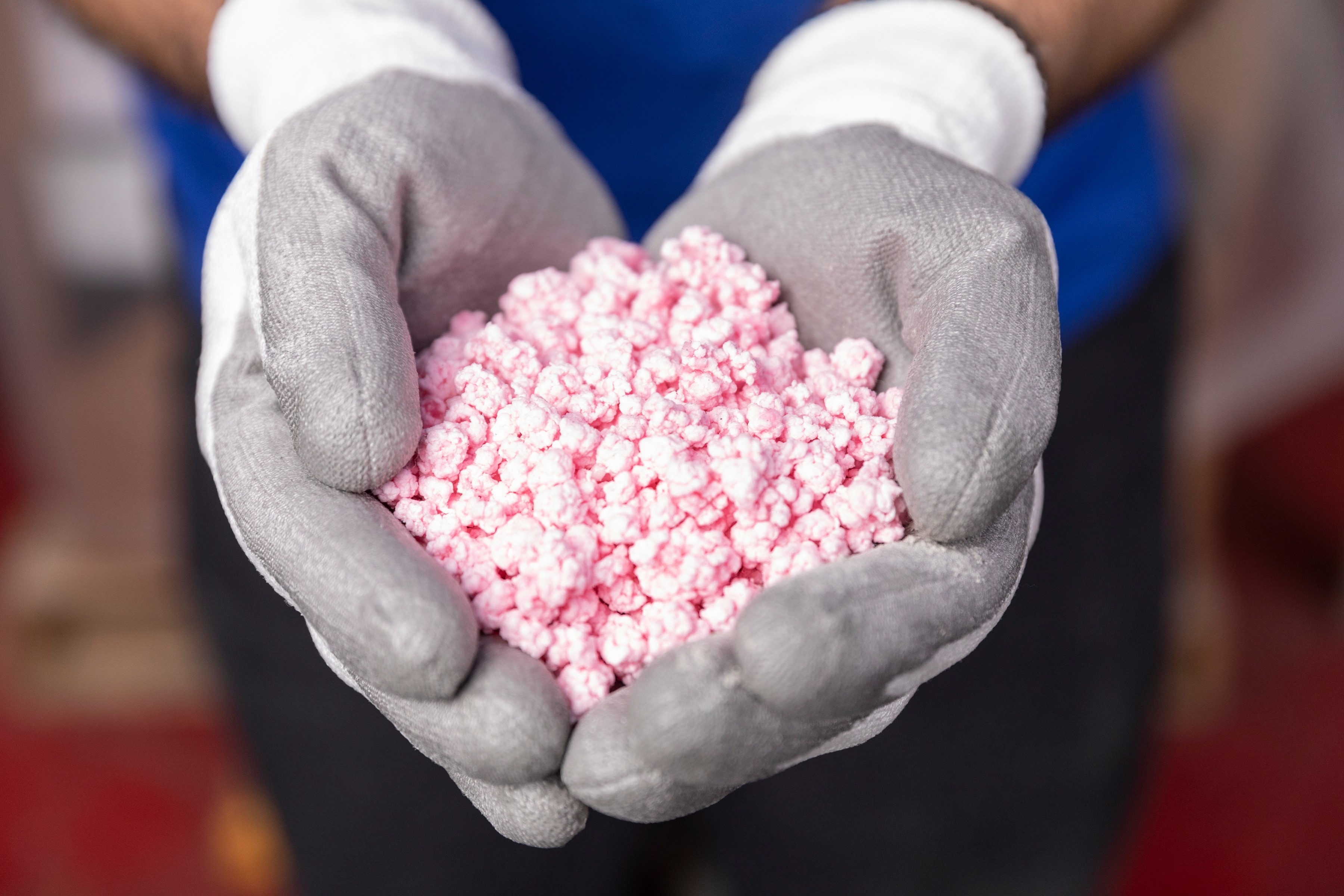
Creating quality recycled feedstocks to simplify reintegration and maximize value in the domestic pipeline
The Future of Responsible Recycling and End-of-Life Packaging
At Nefab and PolyFlex – Part of Nefab Group, we lead the way in responsible recycling and end-of-life (EOL) solutions, ensuring a cradle-to-cradle approach that keeps materials in use, rather than waste. We’re committed to helping companies maximize the financial and environmental benefits of sustainable practices, from creation to recycling.
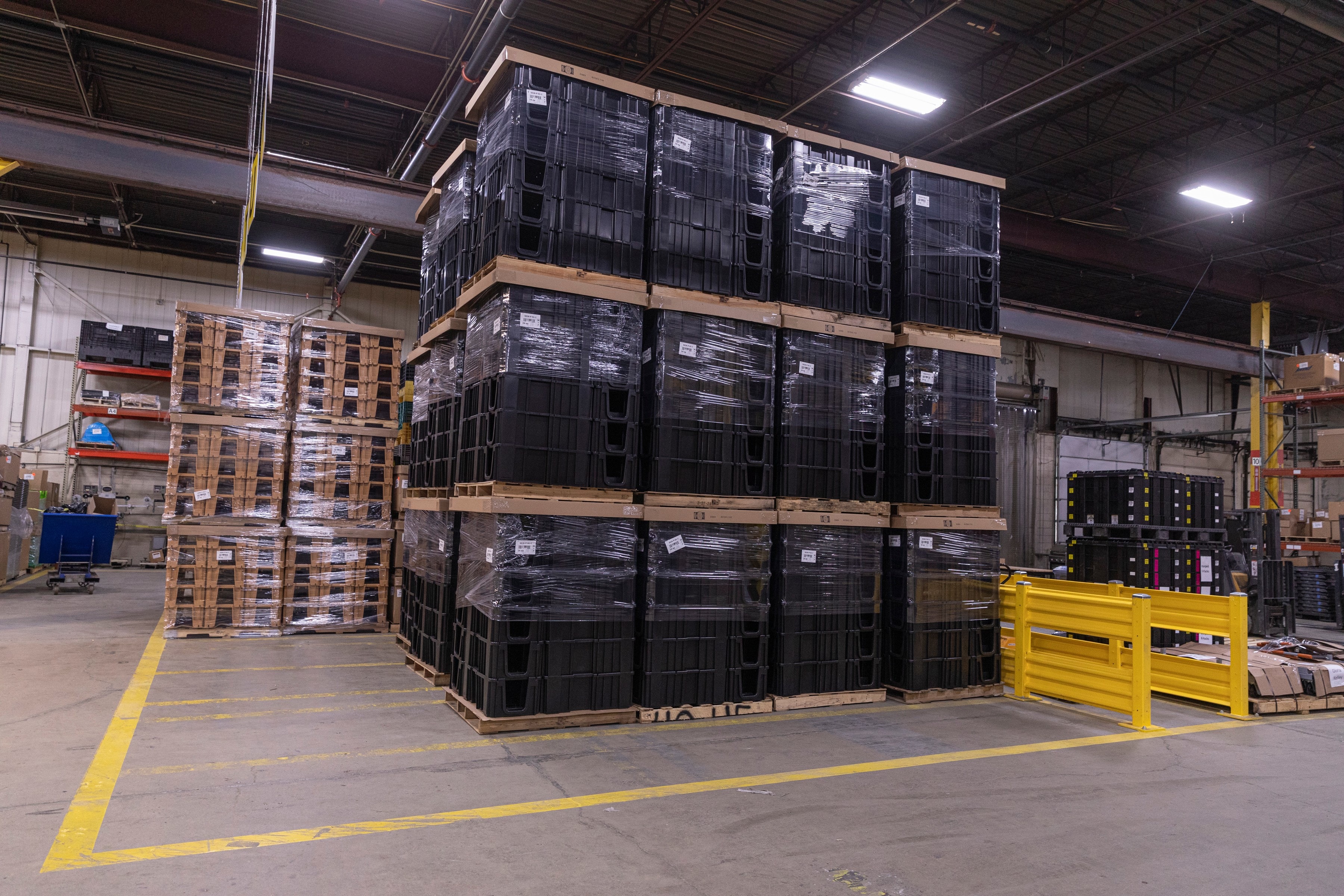
As the demand for EOL support grows, companies investing in these solutions are gaining efficiency, reducing costs, and building trust. Leading automotive OEMs are already ahead of the curve, while others risk falling behind.
Partnering with Nefab and PoyFlex – Part of Nefab Group ensures that packaging fleets continue to provide value, even at the end of their lifecycle, optimizing both financial savings and environmental impact. The shift to responsible recycling is no longer optional—it’s a critical step for businesses to stay competitive and sustainable in the long run. Let us help you lead the way in sustainability.
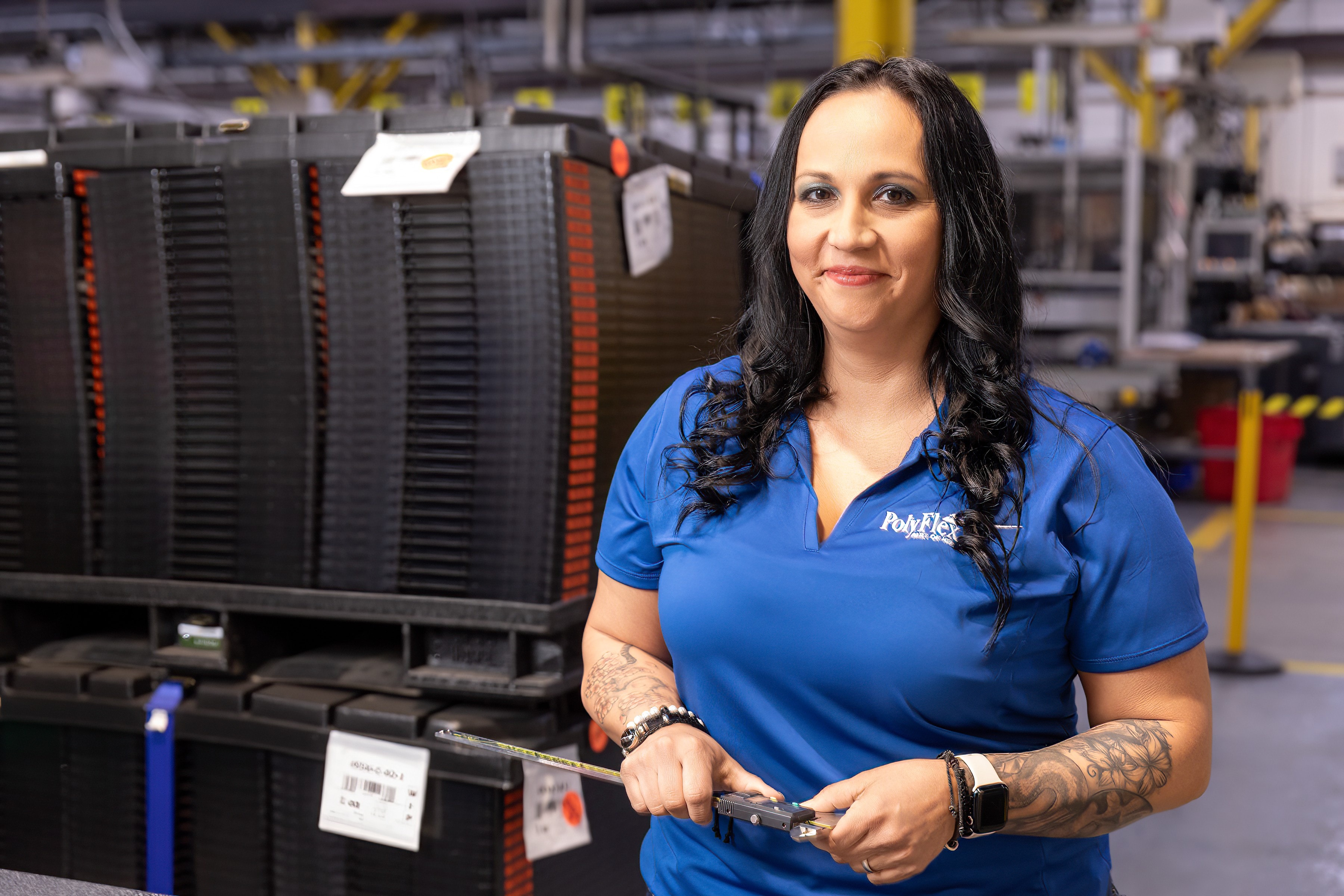
We believe embracing the concept of 'designing for recyclability' is not just an option, but a responsibility to our customers and to the environment
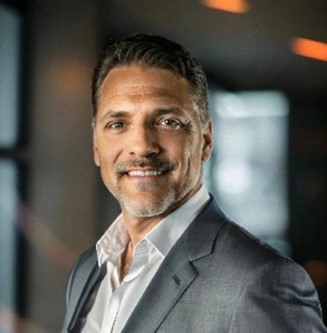
Richard Demko, Director of Sustainability, PolyFlex – Part of Nefab Group “These projects are a great example of how sustainability can drive both environmental and financial benefits. By leveraging tools like GreenCalc to track our progress, we were able to maximize the recycling and reusing of materials, turning what was once considered waste into valuable resources. Our focus on redesigning packaging for recyclability and reusability not only supported our customer’s sustainability goals but also created long-term savings. It's a powerful reminder that with the right strategy, recycling and reusing can transform challenges into opportunities for both our customers and the environment.”